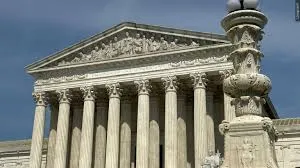Supreme Court Limits Scope of Nationwide Injunctions, Leaves Citizenship Policy Unresolved
By: Ark-La-Tex Staff Writer
The U.S. Supreme Court ruled on Friday that federal judges do not have the authority to issue injunctions that apply nationwide, though the decision did not determine whether a proposed change to birthright citizenship policy could soon take effect.
The Court’s majority opinion, authored by Justice Amy Coney Barrett, stated that lower courts must limit their rulings to the parties involved in each case and not issue universal orders. The justices emphasized that courts are intended to resolve individual legal disputes, not oversee broad executive actions.
The policy in question involves an executive order that would deny U.S. citizenship to children born on American soil to parents who are in the country temporarily or without legal status. Enforcement of this policy is currently paused and cannot proceed for at least 30 more days, per the Court’s decision.
The ruling sends the matter back to the lower courts, where judges must revise their existing orders in line with the Supreme Court’s interpretation of judicial authority. It remains unclear how the decision will impact the broader legal status of the birthright citizenship policy, particularly in the 22 states that have challenged it.
Both the current and previous presidential administrations had expressed concerns over the expanding use of nationwide injunctions, arguing that such rulings exceed judicial authority. More than 40 of these injunctions have been issued since early 2025. The Supreme Court has typically avoided addressing them directly, but made an exception in this case.
Justice Barrett wrote: “When a court concludes that the Executive Branch has acted unlawfully, the answer is not for the court to exceed its power, too.” Her opinion reinforced the idea that federal courts should not assume a supervisory role over executive actions beyond the scope of the case before them.
The decision has received varied responses. Some view it as a reaffirmation of judicial restraint and the constitutional separation of powers. Others expressed concern that it may allow executive actions to take effect despite being ruled unconstitutional by lower courts.
In a dissenting opinion, Justice Sonia Sotomayor, joined by two other justices, argued that the decision could limit the ability of courts to block enforcement of potentially unconstitutional policies. She noted that the executive order in question had already been challenged and found legally problematic by multiple judges.
The Supreme Court’s ruling did not resolve the legal status of the birthright citizenship policy itself. Instead, it focused on whether courts can issue nationwide blocks while a case is still being litigated. Justice Brett Kavanaugh, in a concurring opinion, noted that lower courts might still be able to address the full impact of certain policies by considering “nationwide classes” of affected individuals.
Following the ruling, plaintiffs, including civil rights organizations and multiple states, filed new court documents aimed at maintaining broader protections. Massachusetts Attorney General Andrea Campbell expressed confidence in continuing to challenge the policy and uphold the current interpretation of the 14th Amendment.
Birthright citizenship, based on the principle of jus soli (“right of the soil”), has been part of U.S. constitutional law since the adoption of the 14th Amendment after the Civil War. A landmark 1898 Supreme Court ruling confirmed that nearly all children born in the U.S. are citizens, with few exceptions (such as children of foreign diplomats or those born to enemy forces in wartime).
The current legal debate centers on the phrase “subject to the jurisdiction” of the U.S., which the administration argues excludes certain noncitizen parents. Critics argue that this interpretation deviates from longstanding legal precedent and could redefine citizenship eligibility.
The Supreme Court’s decision means that, for now, lower courts must revise how they apply their rulings while ongoing legal challenges to the policy continue. The Court also confirmed that the administration may announce how it would implement the policy in the future if it is ultimately upheld.
